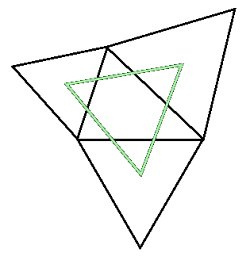- This sentence contains four words.
- This sentence contains five words.
- Exactly one sentence in this list is true.
Science & Math
Unquote

“Sometimes I think we’re alone in the universe, and sometimes I think we’re not. In either case the idea is quite staggering.” — Arthur C. Clarke
Chisholm’s Paradox
Adam and Noah exist here now. Adam lives to be 930, Noah 950. We can imagine a possible world in which they swap ages and yet retain their essential identities. But we can also imagine a further world in which they swap ages and names; another in which they swap ages, names, and hat sizes; and finally a world in which Adam and Noah have swapped all their qualitative properties.
Now isn’t Adam in our world identical with Noah in the other world? For how are they distinct? If a thing can retain its essential identity when a single property is changed, then, writes Willard Van Orman Quine, “You can change anything to anything by easy stages through some connecting series of possible worlds.”
See Spare Parts.
Thrice Sure
Three patricians of the coal yards fared forth on mercy bent, each in his great black chariot. Their overlord, the yard superintendent, had bade them deliver to seven families a total of twenty-eight tons of coal equally divided.
Well out of the yards, each with his first load, Kelly and Burke and Shea paused to discuss the problem of equal distribution — how much coal should each family get?
”Tis this way,’ argued Burke. ”Tis but a bit of mathematics. If there are 7 families an’ 28 tons o’ coal ye divide by 7, which is done as follows: Seven into 8 is 1, 7 into 21 is 3, which makes 13.’ He triumphantly exhibited his figures made with a stubby pencil on a bit of grimy paper:
The figures were impressive but Shea was not wholly convinced. ‘There’s a easy way o’ provin’ that,’ he declared. ‘Ye add 13 seven times,’ and he made his column of figures according to his own formula. Then, starting from the bottom of the 3 column, he reached the top with a total of 21 and climbed down the column of 1’s, thus; ‘3, 6, 9, 12, 15, 18, 21, 22, 23, 24, 25, 26, 27, 28.’ ‘Burke is right,’ he announced with finality.
This was Shea’s exhibit:
‘There is still some doubt in me mind,’ said Kelly. ‘Let me demonstrate in me own way. If ye multiply the 13 by 7 and get 28, then 13 is right.’ He produced a bit of stubby pencil and a sheet of paper. ”Tis done in this way,’ he said. ‘Seven times 3 is 21; 7 times 1 is 7, which makes 28. ‘Tis thus shown that 13 is the right figure and ye’re both right. Would ye see the figures?’
Kelly’s feat in mathematics was displayed as follows;
‘There is no more argyment,’ the three agreed, so they delivered thirteen tons of coal to each family.
— Irvin S. Cobb, A Laugh a Day Keeps the Doctor Away, 1923
Napoleon’s Theorem

Construct equilateral triangles on the sides of any triangle, and their centers will form an equilateral triangle. (This also works if you construct the triangles inward rather than outward. This triangle has the same center as the outward triangle, and the difference in their areas is the area of the original triangle.)
This discovery is traditionally credited to Napoleon, but there’s no evidence supporting that contention. Indeed, this theorem is said to be one of the most frequently rediscovered results in mathematics.
See A Better Nature.
Rational Self-Denial
You are to choose exactly one of two opaque boxes, A and B. A mean demon has put $1,000 in the box he predicted you would not take and nothing in the other. Since you know that the predictions are quite reliable, you can be sure you will pick the wrong box. … [Now suppose] we add a small bonus for taking box B. Some of us are now inclined to say that this modification renders the A option irrational. For it seems that the bonus tips the balance that previously existed between two equally good choices. If taking box A is as rational as taking box B, then the package deal of taking B plus the bonus must be more rational than taking Box A. Yet … if the bonus makes taking B the uniquely rational choice, then you would know that the money was in box A. This knowledge would force you to change your mind in favour of taking box A.
— Roy A. Sorensen, Blindspots, 1988, after Brian Skyrms
Sorensen adds: “Perhaps this reply has some persuasiveness when the bonus is small. But now suppose that the bonus is almost as great as the prize itself, say $900. Wouldn’t it be irrational to forgo a sure $900 by taking box A?”
See Newcomb’s Paradox.
Partly Cloudy

But how are we to figure the change from ‘undecided’ to ‘true’? Is it sudden or gradual? At what moment does the statement ‘it will rain tomorrow’ begin to be true? When the first drop falls to the ground? And supposing that it will not rain, when will the statement begin to be false? Just at the end of the day, 12 p.m. sharp? … We wouldn’t know how to answer these questions; this is due not to any particular ignorance or stupidity on our part but to the fact that something has gone wrong with the way the words ‘true’ and ‘false’ are applied here.
— F. Waismann, “How I See Philosophy,” in H.D. Lewis, ed., Contemporary British Philosophy, 1956
Mirror Years
If you’re over 18, you’ve lived through two years whose dates are palindromes: 1991 and 2002. That’s a rare privilege. Since 1001, the normal gap between palindromic years has been 110 years (e.g., 1661-1771). The 11-year gap 1991-2002 has been the only exception, and we’ll wait a millennium for the next such gap, 2992-3003. Until then we’re back to 110-year intervals, and most people will see only one palindrome in a lifetime.
See Two Milestones.
Conway’s Prime-Producing Machine
Here’s something amazing — a machine made of fractions:

Start with the number 2 as your seed. Multiply it by each of the fractions above, in order, until you find one that produces an integer. (It’s 15/2.) Now adopt that integer (15) as the new seed, and multiply that by each of the fractions until you produce another integer. Keep this up, making a note whenever you produce a power of 2.
The first such power (4, or 22) appears after 19 steps. Fifty steps later, 23 turns up. Then 25 appears about 200 steps further on. A pattern emerges: the exponents are 2, 3, 5 …
It turns out that “these fourteen fractions alone have it in them to produce an infinity of primes, even those that no one yet knows about,” writes Dominic Olivastro. “There is something enormously magical about it.” John Horton Conway devised the technique; it’s an instance of his Fractran computing algorithm.
The Breaks
I once had a friend who objected to assigning chores by lot on the grounds that random selection was biased in favour of lucky people. He claimed to be serious and went on to compare unlucky people with … groups he took to be victims of discrimination. Sincere or not, wherein lies the absurdity of my friend’s objection?
— Roy A. Sorensen, Blindspots, 1988

